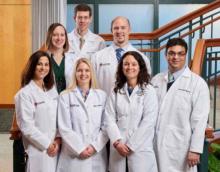The Parkinson’s Disease and Movement Disorders Center at University Hospitals Cleveland Medical Center offers clinical fellowship training in movement disorders. The fellowship can be either 12 months or 24 months in duration and will involve at least 12 months of clinical training and ample opportunity for research participation if desired. We currently accept one fellow per year.
The fellowship offers comprehensive training in various aspects of movement disorders, including the diagnosis and treatment of a vast array of movement disorders, eye movement and balance disorders, pre and postoperative evaluation of patients undergoing functional neurosurgery, intra-operative electrophysiological mapping and testing, as well as botulinum toxin injections for the treatment of movement disorders (dystonia, blepharospasms, and hemifacial spasms), spasticity, as well as drooling and migraine. The training also includes management of baclofen pumps and various other infusion therapies used in movement disorders, as well performing and interpreting video oculography for eye movement disorders.
The fellow will have the opportunity to train with 4 full time fellowship trained movement disorder faculty and 2 full time functional neurosurgeons. There are clinic opportunities 5 days a week, including weekly botulinum toxin injection clinics, as well as one to two deep brain stimulation (DBS) surgical procedures per week. Level of involvement in intra-operative neurophysiology will depend on each applicant’s interests and chosen duration of fellowship training.
The fellow will be involved in several multi-disciplinary clinics and conferences:
- DBS surgical review board (every other week): A multidisciplinary group discussion of prospective DBS candidates. Participants include neurologists, neurosurgeons, neuropsychologists and nurse practitioners.
- Huntington’s disease clinic: Multidisciplinary clinic attended by neurologists, neurogeneticists, psychiatrists, and genetic counsellors. Excellence in the diagnosis and treatment of Huntington’s disease and other genetic movement disorders is focus of this clinic.
The fellow will participate in several educational activities:
- Movement disorder video rounds discussing phenomenology of common and unique presentations.
- Movement disorder conferences: This activity will include didactics, journal clubs, and lectures from local or visiting speakers. The fellow will be encouraged to present at some of these meetings.
- Neurology Grand rounds
- Patient education events, including attendance of the Parkinson’s boot camp event, an event focusing on empowering patients with awareness, education and wellness to take charge over the disease. This event attracts close to a thousand people each year.
There are multiple opportunities to participate and learn clinical, translational, and basic research:
- Clinical trials participation, industry driven, investigator initiated, as well as through the Parkinson’s study group (PSG). Recent studies have looked at treatment of PD, treatment of progressive supranuclear palsy, devices for measurement of PD symptoms, and role of exercise in PD.
- Collaboration with the Case Neuromodulation Center, with internationally renowned translational research activity focusing on translation of neural engineering techniques into clinical practice
- Ocular motor and balance disorders laboratory (Daroff-DelOsso Ocular Motility Laboratory): This endowed laborartory of CASE School of Medicine and Case Western Reserve University is located in the Louis Stokes Cleveland Department of Veterans Affairs Medical Center. The laboratory has unique setup for precise eye and head movement measurements and motion delivery platform with six degrees of freedom.
- Functional Electrical Stimulation Center: A transdisciplinary alliance of active, passionate and committed professionals, in science and medicine, specializing in the fields of biomedical and neural research, engineering, medicine, rehabilitation, and motion analysis research.
- Advance Platform Technology Center: This center focuses on the practical medical needs of individuals disabled by sensorimotor dysfunction, cognitive deficits, or limb loss. The goal of the center is to create novel restorative technologies within a structured framework that facilitates regulatory compliance, dissemination within the rehabilitation community and commercialization by outside manufacturers.
- The Center works closely with collaboration with the other investigators of the Case Neuromodulation Center focuses on using fMRI, DTI and other advanced imaging techniques to discern imaging biomarkers of the altered anatomy and pathophysiology underlying different movement disorders including Parkinson’s disease and dystonia with translation to understanding the disease state, and/or application to translation to improving patient selection, or targets and mechanisms of neuromodulation for treating these disorders.
Practical Aspects
The UH Case Parkinson’s Disease and Movement Disorder Fellowship participates in the Movement disorder fellowship match program through the San Francisco Match program. Applicants should apply during the winter/spring of their PGY3 year, and interviews will be conducted over the summer, with typical match days occurring in September of the PGY4 year.
Application Requirements
Applications should include:
- an introductory letter from the candidate (personal statement)
- curriculum vitae and
- three letters of recommendation.
We only accept board eligible US Citizens, permanent residents or J1 visa candidates.
The focus of the first fellowship year is on providing a strong foundation in diagnosis and treatment of common and uncommon movement disorders. The second year is tailored to the specific interests of the fellow and may include more extensive focus and dedicated time to clinical, translation or basic research, or developing further detailed expertise in specific disease states or procedural therapies including intraoperative neurophysiology for DBS, and botulinum toxin injections.
There is no call during fellowship, and weekends and nights are off, with the exception of calls from the answering service regarding the fellow’s own patients.
Contact
For more information, please contact:
Camilla Kilbane, MD
Director, Movement Disorders Fellowship
Email: Camilla.kilbane@UHhospitals.org


